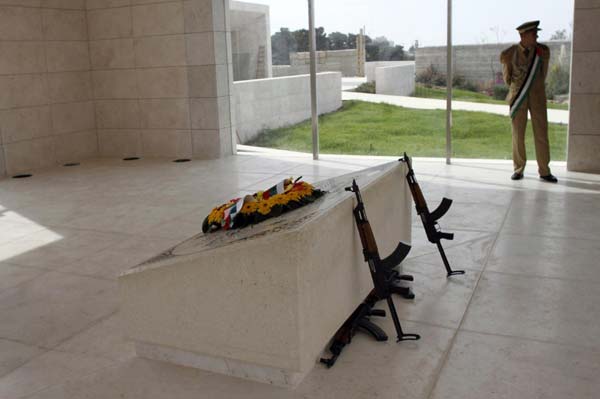RAMALLAH, West Bank - The body of the late Palestinian leader Yasser Arafat is set to be exhumed on Nov 26, eight years after his death, as part of an investigation to see if he was murdered, a diplomat said on Monday.
Two senior Swiss forensic experts are already in the West Bank to discuss plans for the exhumation, which is complicated on a technical, legal and political level.
 |
|
A member of the Palestinian Presidential guard stands beside the grave of late leader Yasser Arafat in the West Bank city of Ramallah Oct 24, 2012. Swiss forensic experts are in the West Bank for talks on exhuming the late Palestinian leader Yasser Arafat to investigate whether he may have been poisoned, a spokesman said on Nov 5, 2012. Picture taken Oct 24, 2012. [Photo/Agencies]? |
A French court in August opened a murder inquiry into Arafat's death after a Swiss institute said it had discovered high levels of radioactive polonium on the Palestinian leader's clothing, which was supplied by his widow, Suha.
Allegations of foul play have long surrounded Arafat's demise. French doctors who treated him in his final days said they could not establish the cause of death.
Suha has said she believes he was poisoned and has requested the exhumation so that samples can be taken from Arafat's body to see whether polonium is present.
A European diplomat said French magistrates were due to travel to the Israeli-occupied West Bank later this month, with Nov 26 seen as the likely date for the body to be removed from its limestone mausoleum.
Two senior employees of Switzerland's Lausanne University Hospital have travelled to Ramallah and are working closely with the Palestinian Authority and French judicial authorities, said hospital spokesman Darcy Christen.
"We have sent our best experts for final consultations," Christen told Reuters. "Scientifically it would still be a viable operation if carried out before the end of November."
Eight years is considered a limit to detect any traces of the deadly radioactive substance, according to the Swiss Institute of Radiation Physics, which is part of the public hospital.
The two experts are Patrice Mangin, chief forensic scientist at the hospital, and Francois Bochud, head of the institute.
"Their on-site mission is in order to have final consultations so that we can all take a final decision," Christen said. "It is to do the fine-tuning. Things are going rather well."
It is still not clear if other members of Arafat's family have given their approval for an exhumation and, with time running out, there is widespread scepticism in the West Bank as to whether his body will ever be removed from the mausoleum.
No autopsy was carried out when Arafat died, aged 75, in keeping with his widow's original request. He had been effectively confined by Israel to his compound for two and a half years before flying to France for emergency medical care.